Skanda Travels Around the World – the Trigger for Palani’s Tale
Skanda enjoyed the journey, circumambulating the world, on his smart, swift peacock, Mayil, his eternal companion. A few more hours, and he would be home, Skanda thought to himself, his face all smiles as the zephyr gently kissed his cheeks. He dreamt of biting into the luscious special fruit.
He passed by multiple moons, planets, and other celestial bodies, along with their governing gods. He waved at Shani, the Lord of Saturn, Guru, the Lord of Jupiter, Mangal, the Lord of Mars, Surya, the Sun God, Chandra, the Moon God, and a few stars as he passed them.
Skanda Meets Dhruv
Dhruv, his favourite star, the eternal one, the one who impressed Lord Vishnu with such unwavering devotion that He gave the young lad a permanent position in the cosmos, waved at him too.
“Hello, Skanda. How are you? All okay at Mount Kailash?”
“Oh yes, my dear Dhruv. In fact, I am very good, considering I am here and my brother, Ganapati, is nowhere close.”
“Aah! And why would your brother not being close by be good to you, my dear boy? Are you in a hurry or do you have time to tell me about it all. You look very excited and I would love to hear a good story.”
“Indeed. Since I’m so far ahead, I think I have sufficient time to tell you all about it. So, here goes.”
Dhruv’s eyes lit up at the thought of listening to a new story. And Skanda continued, enthused by Dhruv’s interest.
“Today, Lord Narada visited our home with a rare fruit called jnanapazham of incomparable taste. He told my parents to give it whoever he thought was the most deserving of the fruit.”
Dhruv filled the pause that Skanda took to catch his breath (he was excited and was talking very fast) with his own ideas. “Lord Shiva told you and Ganapati to share it, right? Wouldn’t that have been the fairest decision?”
Skanda continued the narrative, “Exactly. However, the jnanapazham is no ordinary fruit. It had a unique condition. The fruit had to be eaten whole by one person only and could not be shared.”
“Oh dear! That’s why the competition between the brothers. Tricky situation for your parents, isn’t it?”
“Yes, my parents gave us a competition to help us decide who would get the divine fruit.”
“And what was the competition?” An excited Dhruv asked.
Skanda smiled and said, “We have to circumambulate the world. The first to finish the race would win.”
“Aah! That would be a breeze for you, considering your swift vaahan, Skanda,” Dhruv said, his eyes twinkling with an unmistakable gleam. Skanda was too happy to see it, though. He continued excitedly.
“Yes, yes, I jumped onto Mayil even before Ganapati started thinking about how to win the competition.” Skanda’s laughter rang through space.
But Dhruv frowned, and that stopped Skanda. “What’s wrong, Dhruv?”
“I think you’re underestimating Ganapati. He is a sharp lad, and he knows running around the world, in the physical sense of the world, is impossible for him. Did your parents have another condition?”
“No, nothing else,” said Skanda, lines of worry clearly evident on his face now. The delight of the journey slowly faded. “But what else can ‘circumambulating the world’ mean? It means going around the world, right?”
“In one sense, yes. But what if your parents have left the definition of the prompt open, the ‘world’ could mean anything. For example, my world is this permanent space Lord Vishnu gave me. For the sun, the space he lights up could be his world. For the different moons and planets, the orbits on which they revolve could be the world, and so forth. And you do know that Ganapati is known for his sharp intelligence, right?”
Skanda Returns Home in Anger
Now, Skanda’s face turned dark with anger, both at himself and his parents.
“Oh! How could I have been so dumb? And why was I so hasty that I didn’t stop to think? Let me go home quickly to see what’s happening.” Skanda bid a hasty farewell to Dhruv and rushed home.
The living room area was empty. There was no one waiting for him. His heart turned cold. He shouted at the top of his voice.
“Amma! Appa! I’m back!”
Shiva and Parvati emerged from their chambers and gazed at their son, who was sweating from his efforts to circumambulate the world. Lines of anxiety appeared on their faces when they saw the hurt in their second child’s eyes.
“Where is Anna? And where is the jnanapazham? It’s mine, right? I’ve completed going around the world as you mandated.”
At this moment, Ganapati walked out of his room holding the fruit in his hand.
“Hello, Thambi Muruga, here’s my reward for finishing the race first,” Ganapati said, his face flush with happiness. But the joy faded a bit when he, like his parents, saw the hurt in Muruga’s eyes.
“When and how did Anna go around the world? His vaahan, Mooshak, is too small to finish the race so fast?”
Ganapati replied, a hint of sheepishness creeping into his voice, “I argued that for me the world is our parents. So, I made them sit together on the throne of Kailash, and went around them, not once but three times. I won the fruit like that.”
Muruga fumed, “And you agreed to Anna’s logic,” he asked his parents.
“It’s clearly sound logic, my dear son,” replied Shiva even as Parvati nodded vehemently. However, in a flash, her maternal antenna realised something was wrong, even if she couldn’t pinpoint the mistake her husband and she had made.
“Shouldn’t you have waited for me to return from my sojourn before deciding? Was it right for you to have taken the decision without letting the other competitor, who was still finishing the race, know that he was out of the competition even before completing it?”
Parvati mentally hit her forehead. “How stupid I was!.”
Shiva also realised it and said, “Yes, my dear son. That was our mistake. You see, we received some unexpected guests, and in our hurry, we thoughtlessly gave away the reward to your brother based on the soundness of his logic. We are truly sorry for that haste.”
Ganapati also said, “You are absolutely right, Thambi Muruga. I’m also at fault. I should’ve told them to wait for your return. But my excitement at getting the jnanapazham blinded my judgment. I must atone for the mistake and forfeit the reward. Here, take the fruit. It’s yours.”
Muruga gave his brother a cold stare and said, “I don’t want charity. I want to win the competition fairly and square, which is no longer possible. And it’s clear, Amma and Appa, you favour Anna over me. I’m leaving and will not come back to Mount Kailash. I will find a place where people love me unconditionally.”
So saying, Skanda turned on his heel, got atop Mayil, and left Kailash, heading towards the South.
Skanda Stands on Palani
Meanwhile, Sage Agastya had ordered his devotee, the strong Asura, Idumban, to carry two small Himalayan peaks, Sivagiri and Shaktigiri, to the South of India, near where he lived. Idumban, one of the few survivors from the bloody war between Skanda and Surapadman, became an ardent devotee of Muruga. He became a disciple of Agastya, attending to the sage’s needs while studying under him.
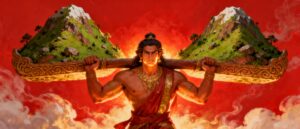
Idumban attached the two hills to a strong yoke, carried it across his shoulder, and walked slowly and steadily towards the southern part of the country. When he reached the Thiru Avinankudi, Idumban put the hills on the ground and sat down to rest.
It was at this time that Skanda reached the same place. Still smarting from losing to his brother, the young lad angrily climbed atop one of the two hills placed by Idumban and stood on its peak. He angrily ripped out all his clothes and jewellery and flung them, leaving only his loincloth on his body. Holding his staff in his left hand, Muruga stood like this, recording his renunciation of his home.
In the meantime, Idumban, having rested for a while, stood up to lift the two hills to be on his way, further south. But, he realised he couldn’t lift the hills. They had become heavier, far heavier than they had been before. Finding it strange, Idumban stepped back and noticed a young boy, dressed in nothing but a loincloth, standing atop one of the hills.
He walked up and addressed the boy, “Who are you and what are you doing on my hill. I need to take it further south to my guru’s ashram. Get off it.”
This random stranger ordering him to get off the hill added fuel to his already seething fire. His voice was cold with anger when he addressed Idumban. “How dare you speak to me like that? I will not move from here. This is my place now.”
The heated exchange of words escalated into a physical altercation between Muruga and Idumban, and, as expected, Idumban suffered defeat. However, he realised that the young boy was none other than Muruga, the one who had defeated his master, Surapadman.
Humbly accepting defeat, Idumban said, “Lord Skanda, You are my god, and I am your ardent devotee. But tell me, why are you here instead of your home? And why are you so angry?”
Somewhat mollified by Idumban’s humility, Skanda narrated the story of his journey to Thiru Avinankudi to the Asura. By this time, Shiva, Parvati, Ganapati, and a host of ganas had reached the place to try to convince Skanda to return home.
Idumban bowed to the divine residents of Kailash and moved to the side to watch the family drama unfold.
Ganapati came forward to mollify his younger brother again. “My dear Thambi, I take responsibility for the entire episode. I should’ve waited for you to return before claiming the fruit. Please forgive me and forsake your anger. Return home.”
Skanda replied, “I’m not angry at you, Anna. As competitors, we have the right to interpret the question or test as we deem fit. The responsibility of fairness lies with the organisers, in this case, our parents. I’m angry with them. By the way, circumambulating our parents was a clever move. But I can’t forget what our parents did to me.” He refused to even make eye contact with Shiva and Parvati.
His father came forward, “C’mon, my dear son, you know we love you both equally. It was an impulsive decision, and both you and I have apologised for our behavior, and we mean it from the depths of our heart. Please return home, right now.”
But Skanda looked unmoved and stared ahead, his firm stance reflecting his willpower. It was Parvati’s turn, who tried cajoling first, and then even admonished her son for his stubbornness.
Shiva’s army, which was under the command of Muruga, also tried to plead with him, all to no avail.
Skanda Sees the Light of Wisdom – He Becomes Palani
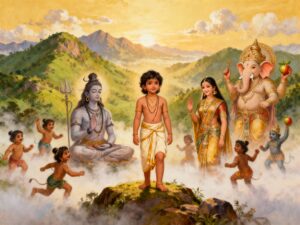
Finally, Shiva came back to speak to his son. He said, “Remember, forgiveness comes above setting things right with your principles. All of us are bound to make mistakes, and it is the superior person who finds the courage and strength to forgive. You, the holder of all wisdom, should know this more than anyone else. Why are you hankering after the pazham when you are the Jnana Pazham yourself?”
“I am the fruit of wisdom,” Skanda repeated his father’s words.
“Yes, Pazham Nee, Appa,” everyone present there chorused.
These words cleared the air for Skanda, and he forsook his anger, falling at his father’s feet. “I agree, Father. I’ve been behaving immaturely. I let my ego cloud my judgment. I was so confident that I was faster than Anna that I forgot he’s cleverer than me. I focused on winning rather than thinking through the process of taking part in the competition smartly.”
He walked across to Ganapati, who was now all smiles. “I’m sorry, Anna, for thinking I’m better than you. We are equals because we are good in our own ways, for our own good.” The brothers hugged each other followed by a family hug even as the divine residents from Kailash cheered at the happy ending.
Shiva made a declaration, “This place will henceforth be called Pazham Nee because the fruit of wisdom itself stands here, holding a dhandam representing punishment for sins, and wearing nothing but a koupeenam reflecting the need to sacrifice all to truly understand the meaning and purpose of your life. Those who carry kavadis like Idumban carried the two hills will have their wishes fulfilled.”
“And,” Shiva continued, “since Muruga stood with a dhandam, he will also be called Dhandayudhapani.”
Glossary
Pazham – A Tamil word meaning fruit
Jnanapazham – fruit of wisdom.
Pazham Nee – Tamil phrase meaning, “you are the fruit of wisdom.”
Palani – Pazham Nee became colloquialised to Palani. Tamilians pronounce and write the word as Pazhani.
Koupeenam – loincloth
Anna – elder brother
Thambi – younger brother
dhandam – staff
Author’s Note:
Palani is one of the six temples of Muruga, collectively referred to as Aarupadaiveedu. The stories of the Aarupadaiveedu or the six divine houses of Muruga appear in Skanda Purana. The earliest known work recording the stories of Aarupadai Veedu is believed to be Thirumurugaatrupadai by a legendary poet called Nakkeerar. The work is believed to have been recorded between 1 CE and 3 CE, during the Sangam Era and/or post-Sangam Era. The story of Idumban and Sage Agastya recorded here is part of Tamil folklore.
The idol of Muruga in Palani is believed to be made by Bogar, one of the eighteen highly talented, knowledgeable, and wise Siddhars, or medicine men. He is believed to have mixed nine potent, some even individually poisonous to create something called navapashanam (Tamil word translating to ‘nine herbs and medicines’) to make the idol. The water used for the abhishekam of the idol is drunk by devotees, in the belief that it has the power to heal illnesses and diseases, thanks to the potent navapashanam.
This blog post is part of ‘Blogaberry Dazzle’
hosted by Cindy D’Silva and Noor Anand Chawla.
Images created using Perplexity
Read the story of the birth of Ganapati here.


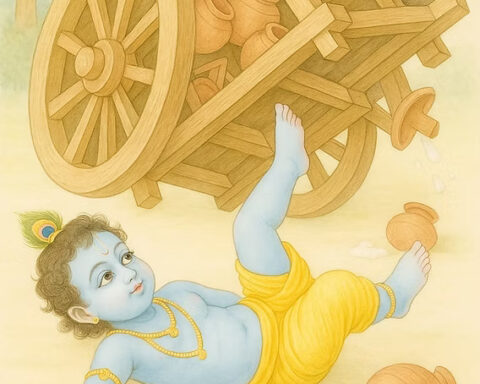
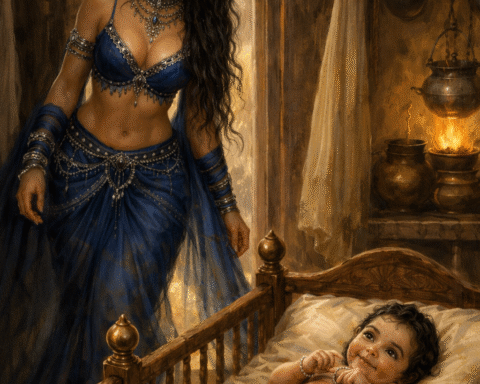
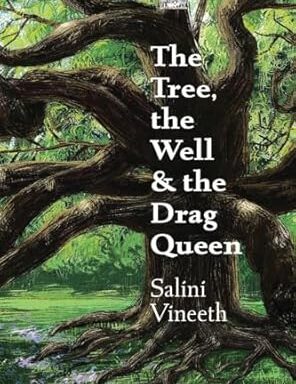
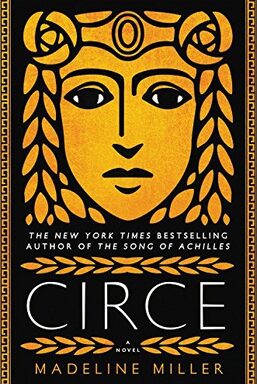
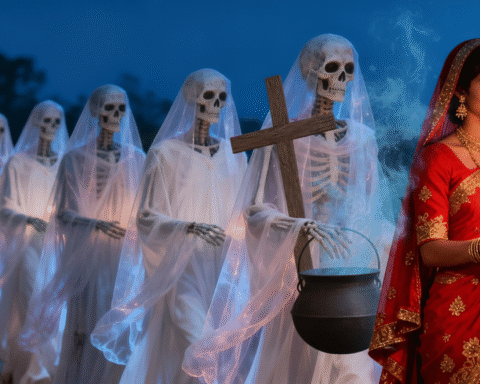
I always find mythology a bit complex, but you made the story behind the “Abode of Peace” so easy to follow and engaging.
As usual, I have not heard of this story. Your mythology storytelling is awesome. I just want to know if the Tamil words were used then or it came up later- Jnanapazham, Pazham, Anna, Thambi and others.
The words of Shiva ( or yours) -forgiveness comes above setting things right with your principles. All of us are bound to make mistakes, and it is the superior person who finds the courage and strength to forgive.” are full of wisdom and are relevant even today.
I am fascinated by how beautifully you every tale.
I’d like to drink the medicinal water to heal my illness. You’ve given me a new place to think about and how to get there. And so many lessons between parents, siblings and the world around us. Truly, the one who forgives and moves on is the wiser person.
Thank you so much for explaining in such simple beautiful way. I never heard about this but this makes your blog even more intriguing!
Incidentally I was in Kodaikanal just last month, right in the middle of Palani hills. So interesting to read the story fresh off my visit. Thanks for sharing this Ratna
My mother-in-law is from Palani, but I didn’t know this story at all. Thanks for sharing. I have ben wishin o visit the aarupadaiveedu; hope Murugan fulfills it. Have seen only Thiruchendur so far.
Another new story for me. The mythological stories you write here are very easy to read and comprehend. The lessons and the message are also very clearly put forth.
I am hoping to visit Palani sometime soon. This beautiful story has made me even more eager to plan the visit. I hope I can get to drink the medicinal water.
We all are born with unique qualities and we need to appreciate others calibers and quality while working smartly on what we are good at. Overconfidence cannot take us ahead in long run. I am aware of this story and one day I said it to my son also… he understood a little but not totally… I will try again. Thank you for this retelling.
Really lovely piece. I enjoyed how you brought to life the sacredness of Palani and the journey up to the templ, it felt like a quiet walk in history, faith and devotion. Your writing makes the legends around Murugan feel accessible and meaningful.
Have heard this story since childhood but never knew what happened after Lord Ganesh wins in the competition. Thanks for sharing this. No wonder there are no Kartikeya temples in North India. He chose his abode down South.
What a lovely way to narrate this tale. I enjoyed reading it and would be nice to be able to narrate to children. The memory of the petulant muruga that we grew up on is suddenly a sage one through your story.
Wow, what a vivid and captivating retelling! The story beautifully blends adventure, divine drama, and life lessons. Skanda’s journey, his clash with Ganapati, and ultimate wisdom at Palani teaches patience, humility, and the true meaning of the jnanapazham.
I have heard the first part of the story about the co.petition but the latter part was something new and exciting for me. Thank you for bringing such unique gems for us to read.
Your post gave me a gentle, moving journey — I felt the calm, reverence and mystery of Palani as you described it. Your detail about the legends and spiritual weight made me want to visit and experience that peace for myself. Thank you for sharing such a thoughtful and soulful account.
I absolutely loved this retelling..this is one story which my kids love to listen